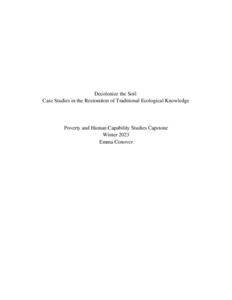Decolonize the Soil: Case Studies in the Restoration of Traditional Ecological Knowledge

View/
Author
Conover, Emma
Subject
Washington and Lee University, Shepherd Poverty Program
Traditional ecological knowledge
Decolonization
Group identity
Metadata
Show full item recordDescription
Capstone; [FULL-TEXT AVAILABLE] Emma Conover is a member of the Class of 2024 of Washington and Lee University. Because of rich environmental, linguistic, and cultural history and culture, NGOs and government agencies in Latin America have been studying and implementing cultural knowledge restoration for decades. This investigation aims to measure the efficacy in implementation of these systems, and suggests how future projects could be better executed. Traditional Ecological Knowledge (TEK) is the generalized field of study regarding implementation of cultural knowledge. . . . Decimation of cultural knowledge, traditions, and peoples is also a poverty related issue. Traditional economic systems in the Andes have been replaced by a globalized, capitalistic model, where indigenous communities typically lack sovereignty over their assets. Assets not only include businesses and investments, but social capital, environment, and cultural institutions. In Latin America, indigenous peoples are twice as likely to experience poverty than those who identify as mestizo. Indigenous peoples are also substantially more likely to feel adverse effects of climate change, making global warming a significant social determinant of health for indigenous populations (Lines, 2019). The efficacy of traditional ecological knowledge is of pressing importance, if it can be proven to serve as a means of protection for land and people. This paper focuses on two case studies of examples of attempted restoration of cultural knowledge through agricultural practices; raised agricultural beds in Peru and potato agriculture. The efficacy of these projects are expressed in the analysis section by the metrics of longevity, externalities, agricultural production, and social effects. In conjunction with measures of adherence to locally-led development, this paper will aim to measure how well these development standards can account for project efficacy. [From Introduction]